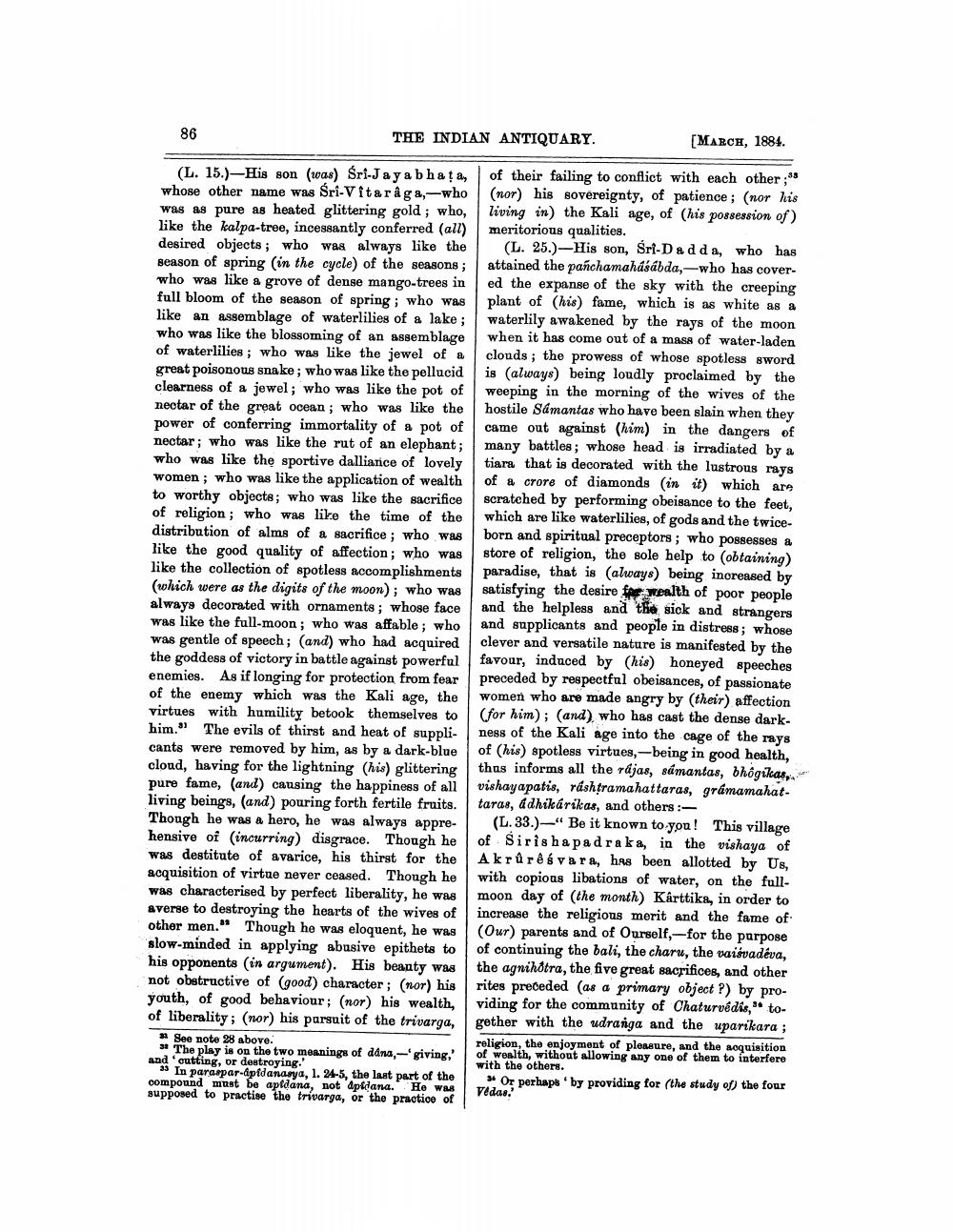________________
86
THE INDIAN ANTIQUARY.
[MARCH, 1884.
(L. 15.)- His son (was) Sri-Jayabha ţa, whose other name was Śri-Vitarâga, -who was as pure as heated glittering gold; who, like the kalpa-tree, incessantly conferred (all) desired objects; who was always like the season of spring (in the cycle) of the seasons ; who was like a grove of dense mango-trees in full bloom of the season of spring; who was like an assemblage of waterlilies of a lake; who was like the blossoming of an assemblage of waterlilies; who was like the jewel of a great poisonous snake; who was like the pellucid clearness of a jewel; who was like the pot of nectar of the great ocean ; who was like the power of conferring immortality of a pot of nectar; who was like the rut of an elephant; who was like the sportive dalliance of lovely women ; who was like the application of wealth to worthy objects; who was like the sacrifice of religion ; who was like the time of the distribution of alms of a sacrifice; who was like the good quality of affection; who was like the collection of spotless accomplishments (which were as the digits of the moon); who was always decorated with ornaments; whose face was like the full-moon; who was affable; who was gentle of speech; (and) who had acquired the goddess of victory in battle against powerful enemies. As if longing for protection from fear of the enemy which was the Kali age, the virtues with humility betook themselves to him.” The evils of thirst and heat of supplicants were removed by him, as by a dark-blue cloud, having for the lightning (his) glittering pure fame, (and) causing the happiness of all living beings, (and) pouring forth fertile fruits. Though he was a hero, he was always apprehensive of incurring) disgrace. Though he was destitute of avarice, his thirst for the acquisition of virtue never ceased. Though he was characterised by perfect liberality, he was averse to destroying the hearts of the wives of other men." Though he was eloquent, he was slow-minded in applying abusive epithets to his opponents (in argument). His beanty was not obstructive of (good) character; (nor) his youth, of good behaviour; (nor) his wealth, of liberality; (nor) his parsuit of the trivarga,
See note 28 above.
The play is on the two meanings of adna, -giving,' and cutting, or destroying.'
* In paraspar-pfdanasya, 1. 24-5, the last part of the compound must be apdana, not ap dana.HO WA supposed to practise the trivarga, or the practice of
of their failing to conflict with each other;" (nor) his sovereignty, of patience; (nor his living in the Kali age, of (his possession of) meritorious qualities.
(L. 25.)-His son, Sri-Dadda, who has attained the panchamahásábda, --who has covered the expanse of the sky with the creeping plant of (his) fame, which is as white as a waterlily awakened by the rays of the moon when it has come out of a mass of water-laden clouds; the prowess of whose spotless sword is (always) being loudly proclaimed by the weeping in the morning of the wives of the hostile Samantas who have been slain when they came out against him) in the dangers of many battles; whose head is irradiated by a tiara that is decorated with the lustrous rays of a crore of diamonds (in it) which are scratched by performing obeisance to the feet, which are like waterlilies, of gods and the twiceborn and spiritual preceptors; who possesses a store of religion, the sole help to (obtaining) paradise, that is always) being inoreased by satisfying the desire for wealth of poor people and the helpless and the sick and strangers and supplicants and people in distress; whose clever and versatile nature is manifested by the favour, induced by (his) honeyed speeches preceded by respectful obeisances, of passionate women who are made angry by (their) affection (for him); (and), who has cast the dense dark. ness of the Kali age into the cage of the rays of (his) spotless virtues,-being in good health, thas informs all the rájas, samantas, bhogikas vishayapatis, ráshtramahattaras, grámamahat. taras, adhikarikas, and others :
(L. 33.)—“Be it known to you! This village of Sirisha padraka, in the vishaya of Akrûrês vara, has been allotted by Us, with copious libations of water, on the fullmoon day of the month) Kárttika, in order to increase the religious merit and the fame of (Our) parents and of Ourself,---for the purpose of continuing the bali, the charu, the vaisvadeva, the agnihotra, the five great sacrifices, and other rites preceded (as a primary object P) by providing for the community of Chaturvedis," together with the udranga and the uparikara ; religion, the enjoyment of pleasure, and the acquisition of wealth, without allowing any one of them to interfere with the others.
* Or perhaps by providing for the study of the four Vedas.




